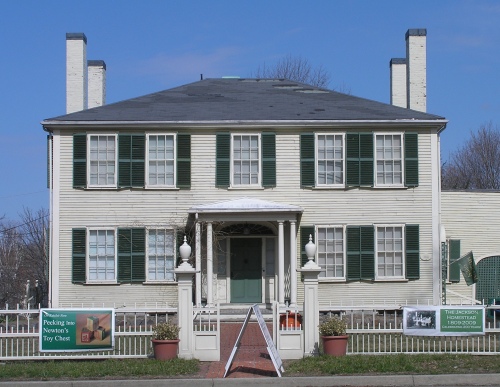Jackson Homestead (1809)

In about 1670, Edward Jackson built a saltbox house on his farmland in a section of Cambridge south of the Charles River in what is today the City of Newton. Edward was involved in the movement to seperate Newton from Cambridge. His son, Sebas Jackson also lived in the house, followed by his son Joseph and then his son, Lt. Timothy Jackson, who died in 1774. Over these years, the original property was subdivided. Lt. Timothy Jackson’s widow, Sarah Smith Jackson, was left to look after the farm, while her son, Maj. Timothy Jackson, fought in the Revolutionary War. In 1809, Timothy replaced the old homestead with a new mansion house in the Federal style. After his death in 1814, with his sons having moved to Boston, the house was rented to a farmer, but eventually Timothy’s son, William Jackson, who, like his father had a notable public career, moved into and the house in 1820 and enlarged it. William started a soap and candle factory and a was a general agent for the Boston and Worcester Railroad and ensured that the line would be routed through Newton.
William Jackson’s house is well documented to have been a station on the Underground Railroad. William’s brother, Francis Jackson, was also an abolitionist and a colleague of William Lloyd Garrison. Francis was the author of A History of the Early Settlement of Newton (1854). After William’s death in 1855, his widow, Mary Bennett Jackson, and three unmarried daughters occupied the house. One of these daughters. Ellen Jackson, wrote a memoir of growing up in the home called Annals from the Old Homestead (1895). William’s decedents lived in the homestead until 1932, when it was rented. The Jackson Homestead was later owned by Frances Middendorf, who left it to the City in 1949. It became the Netwon History Museum in 1950. There is a pdf document with further details about the Homestead and the Jackson family.